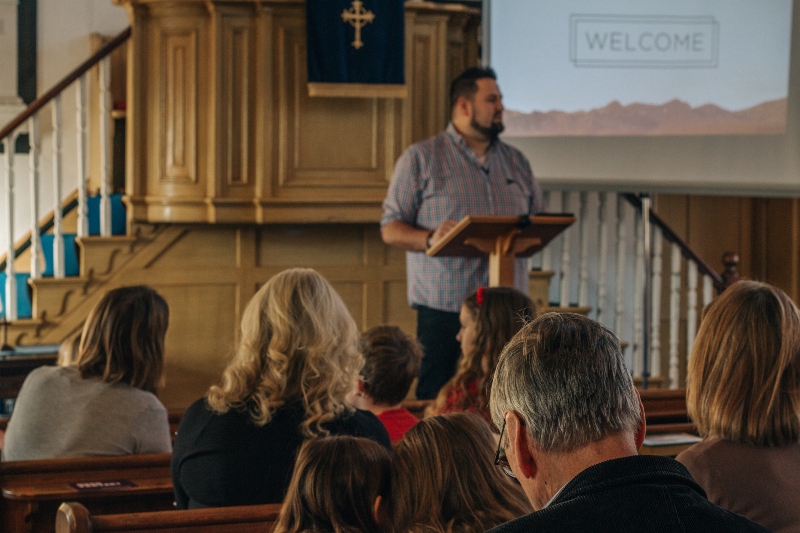The Missing Generation that’s right in front of us
Baptist minister and millennial Adrian Semerene offers this reflection on what his generation values, and the possibility of connection

“We’re just different generations, and I will never understand your generation!”
That was how the conversation ended. Twenty minutes backwards and forwards, about a short video I showed in a recent service. While ‘the rest of the church’ laughed, smiled, and saw the depth of the message presented, this particular person was deeply offended and found it necessary to tell me, expecting an apology. Sure, I was deeply apologetic that offence was taken, but my dilemma came from the mere fact that if I were ever to be presented with the decision to show the video again, my actions would remain the same…
I have spent much time reflecting on this, and many other conversations through the years that seem to result in a conclusion that our generations are just ‘different’ and how ‘times have changed’. Yet we are all brothers and sisters in Christ, called to be one. As such we must make the efforts to better understand one another, so as to love one another, as well as reach those around us who have yet to enter into a deep relationship with Jesus. In one sense, it is easy to ‘get to know’ a certain older generation, because many of our churches represent and reflect them very well. However, there is a well documented ‘missing generation’ that is harder to get to know, simply because, well, they are missing. Please don’t misunderstand me, they are not non-existent, I am one, and there are many churches across our union that have some, or many worshipping and present in their churches…. BUT, we’ve been called the missing generation for a reason. Most know us as millennials.
I quickly want to clarify that I am no expert, and there are many much better qualified people out there for that. Some you will find in this magazine, and I encourage you to reflect on them all. And while I also know that my experiences are not everyone’s, conversations with many people in different contexts across the UK and beyond have led me to believe that there is much similarity across the spectrum. I also hasten to add, much of these are generalisations and I apologise if you or someone you know doesn’t fit with these thoughts, but please know that many (if not most) do.
So, who are millennials and what do they want out of church? These are some of the things that characterise us:
We are deeply relational: As millennials, we are not after information or knowledge. We have that at our fingertips, literally with our devices. We are looking for relationship, deep and meaningful relationships. The truth is, that type of relationship is not going to be achieved in a 1-2 hour service once a week. That relationship is built through investment of time. That relationship is built through meeting for coffee regularly; it is built through having relevant small groups in which the Bible is talked about, but where there is also scope to share each other’s lives and walk alongside one another, applying the truths that we see in scripture. One of the reasons we’ve seen such rapid growth on social media sites is because as a generation we want to be connected with one another regularly. Please don’t misunderstand me, there is a lot wrong with social media; however, it is the drive for relationships that leads many of us there in the first place.
We seek authenticity: As millennials, we are seeking to be real with one another. We have friends and family members who are struggling with addictions, who make mistakes regularly, who are journeying through questions of sexuality and identity… or we are ourselves. We are looking for a place and people to journey life with, in all its realness and mess. We long for authenticity, and can tell when people are trying too hard to be something they are not, or aren’t allowed to be who they are for fear of judgement. Don’t get me wrong, this is hard, and messy. As a Christian who holds conservative views, this can sometimes be difficult, but surprisingly, when we are open and honest with one another, relationships go deeper, and we find ways to move forward together.
We are doers: One of the ways we build that deep relationship and journey in authenticity is by getting plugged in, and doing. I have a friend who is a minister (and a great one at that); however, there is a policy he has which I disagree with. He and the team have established that new members to the fellowship are not allowed to serve in the church for a year, so that the church can better get to know them and vice versa. In part, that is a great policy, that also seeks relationship prior to service. However, as millennial, I wouldn’t attend his church. If I was told I couldn’t serve, I would feel lost and would quickly find myself moving on. This may be a sad reality, but it’s a truth. As a generation we believe that part of our deep relationality is serving one another and we feel cut off if we’re not allowed. Often we are told that we can’t serve because of our age… That never goes down well, as we believe that we may do things differently, but we can do it, because if we can’t ourselves we’ll find someone who can.
We are visual: I have found that we as a generation like to see things. We visualise sermons, we visualise worship, visualise our lives and futures. Some of this is cross-generational and simply explained as a learning style. Some of it is simply deeply embedded in us. We are the generation that saw our phones go from the brick to a beautiful HD screen with which we can capture the highest quality photos and videos. We are visual. Our social networks reflect much of that nature.
We are perfectionists: This term is perhaps too harsh. However, as a generation we like to see things done properly. Many of us would rather not see something done than see it done badly. While it may seem petty, this stretches to things such as screen visuals, announcements, sermon illustrations, sung worship, etc. Much of this drive of perfectionism within church comes from a deep desire to do and give our best to God. This is often misunderstood as us trying to be ‘flashy’. We are just being us.
There is much more that could be shared (we are connected, we are driven, we are optimistic and hopeful), yet this seems a good way to start. The question then becomes for many of us, what do we do to draw and connect with the missing generation? Change! Fact is, we aren’t missing everywhere, there are churches who have embraced the change that is needed to welcome, engage and journey with us. But that change puts many people off. We hear change and we hear having to abandon our roots, our beliefs, our ways of doing things, our roles and so much more. While some of that is true, not all of it has to be.
The change is not about changing our beliefs, but changing how we ‘express those beliefs’ perhaps. In one of my previous churches, there were three elderly members of the fellowship (85-93) that always stand out in my mind. These three continually encouraged me, pushed me, prayed for me, and released me to do things differently. We’d often have conversations in which they might say, “I don’t necessarily like it, or understand it, but I see what God is doing in it, so I can get behind it.” They spoiled me: I thought that’s how it would always be. It isn’t. But maybe that’s how it’s meant to be?
There’s a missing generation because the generations before failed to connect with them. That may seem a harsh reality, but it is a reality nonetheless. I wonder what role you might have to play to reach that generation? And if you are a millennial, what is your next step to engage with the churches that may not know what to do with you? If you are part of the generations prior to us, I wonder role you might have to play to make space, to welcome, to be authentic with the millennials right in front of you?
One thing is for sure, we need to start working together on this quickly, because there is another generation rising up, that brings with them everything that millennials do, and more, to learn from, and change and adapt for. Gen Z might have to wait until another article though, we have enough to reflect on…. For now!
 Adrian Semerene is minister of Gaminglay Baptist Church, Cambridgeshire. He became a member of Baptist Union Council in 2019
Adrian Semerene is minister of Gaminglay Baptist Church, Cambridgeshire. He became a member of Baptist Union Council in 2019
This reflection appears in the Summer 2020 edition of Baptists Together magazine
Do you have a view? Share your thoughts here.
Baptist Times, 11/05/2020